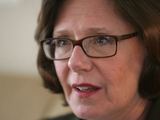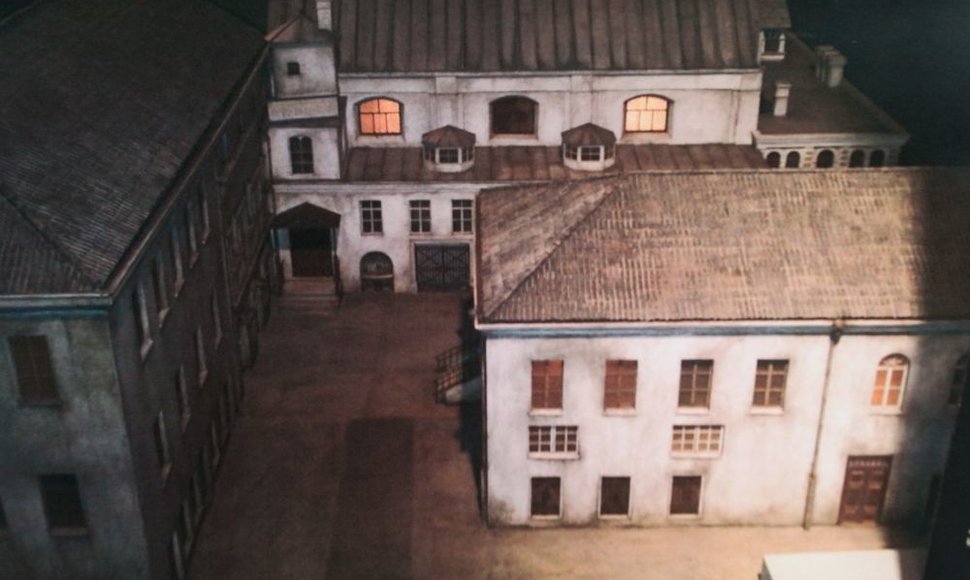So it was for me personally poignant to welcome the U.S. Ambassador to Lithuania, Anne E. Derse, to the American Jewish Committee in San Francisco for a special breakfast meeting April 10.
 |
| Juliaus Kalinsko/„15 minučių“ nuotr./US Ambassador to Vilnius Anne E. Derse |
Ambassador Derse is a career diplomat who has served her country with great distinction for 30 years. She is a most charming and gracious personality who has involved herself with the remaining Lithuanian Jewish community of approximately 4,000, almost all of whom live in the capital city of Vilna (today called Vilnius).
Since arriving in Vilna in 2009, Ambassador Derse has been at the forefront of lobbying the Lithuanian political leadership on the issue of restitution for Jewish community property, seized first by the Germans and later by the Soviets. AJC’s director of international Jewish affairs, Rabbi Andrew Baker, worked closely with Ambassador Derse and described her role as pivotal in the success-ful outcome of those lobbying efforts.
On April 4, Lithuanian Prime Minister Andrius Kubilius announced an award of $52 million in restitution funds to be distributed over 10 years. The funds will be administered by the Foundation for Jewish Heritage and used for religious, health care, educational and cultural purposes.
The passage of the restitution bill was a historic moment for the Lithuanian parliament; Lithuania is only the third country, after Germany and Austria, to pass such a bill. A statement issued by the Jewish community after the announcement said: “The bill reflected the Lithuanian government’s recognition of its moral obligation to provide compensation for stolen Jewish property.”
Lithuania gained its independence in 1918 after being part of the Russian Empire. At the outbreak of World War II, the Jewish population of Lithuania was estimated at 260,000. It was a community with a wellspring of Jewish learning and home to the great 18th century scholar Rabbi Elijah ben Solomon Zalman, more commonly known as the Vilna Gaon (genius). The “Jerusalem of the North” also was home to many Jewish schools, synagogues and a remarkable Jewish communal structure. Other cities and towns, especially Kovno (called Kaunas today), which served as the capital during World War II when Vilna was part of Poland, had a similarly vibrant Jewish life.
The demise of the Jewish population began in 1939 when the Soviet Union invaded Lithuania as part of the Molotov-Ribbentrop Pact. The German invasion followed, and by 1945, 97 percent of the Jews of Lithuania had perished. My mother’s entire family — parents, brothers, sisters and their offspring — lost their lives in the Holocaust. Birzh, which was once 40 percent Jewish, is today Judenfrei. The Soviets and Germans were willingly aided and abetted in their murderous efforts by the local population.
At the end of the war, Lithuania became a Soviet Republic (and was to remain so until 1991). No mention was made in any form — schools, universities, books, newspapers, public forums — of the tragedy that had befallen the Jewish community. A memorial erected in Vilna in memory of the Jews was defaced by the Soviets and the word “Jew” removed.
Lithuanians born during and after the war knew nothing about the country’s Jewish heritage or the complicity of their own compatriots in the fate of the Jewish community. As in other Soviet-dominated and -controlled countries, the official line stated that Communists had been the primary targets of German atrocities.
Today, some 67 years after the end of the war, this avoidance of the truth is gradually changing. According to Ambassador Derse, who herself has directed embassy funds to seminars and education on the Holocaust, curricula containing Holocaust studies are being introduced into schools and, as she told us, a “door is opening and an awareness is gradually replacing ignorance.” The monetary restitution is a striking example of the government’s readiness to acknowledge and recognize what occurred.
The descendants of those Litvaks (Jews from the Baltic states) who left before World War II are scattered throughout the United States. Ambassador Derse’s closing remark was for those who have a connection to Lithuania to visit the country, contact the Jewish community and receive a very warm welcome.
Mervyn Danker is executive director of the American Jewish Committee’s regional office in San Francisco.












